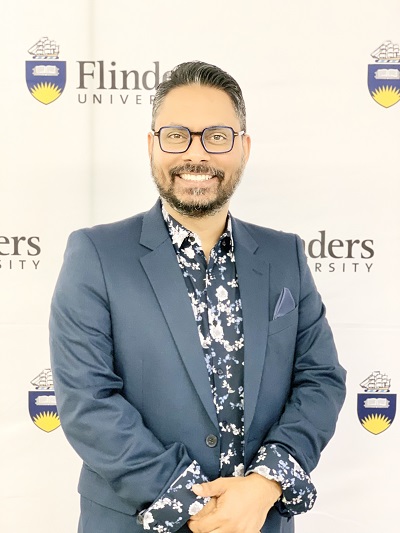
A Flinders University Caring Futures Institute research study launching in early 2021 will test brain stimulation as a possible long-term treatment for tinnitus.
Flinders’ new Professor of Audiology Dr Raj Shekhawat is leading the three-year study to investigate if a form of non-invasive stimulation of specific areas of the brain can suppress ringing of the ears for an extended period.
Tinnitus is a common condition that constantly effects about 1 in 6 people in Australia and is described as a ringing, buzzing, hissing or humming sound in the head or the ears.
There is no cure nor treatment that offers long-term relief, however, management strategies include psychological therapy to reduce the stress and anger associated with experiencing the condition.
Ongoing tinnitus can impact a person’s quality of life, causing them frustration and lack of sleep and in severe cases depression and anxiety.
Dr Shekhawat, who moved from the University College London (UCL) to Flinders University in September 2020, has undertaken preliminary studies into the effectiveness of transcranial direct current stimulation (tDCS) in treating tinnitus.
Some participants experienced a suppression of the ringing in their ears but only for a few hours or up to a few days.
Now Dr Shekhawat is determined to investigate whether high definition tDCS can reduce loudness and annoyance of the condition more effectively and for a longer period.
He described the project as “very novel” and “almost one of its kind in the world”.
“This project will give us information about the various brain networks which are involved and what happens to those brain networks when we do this stimulation,” he says.
“Some people are feeling that their tinnitus perception goes down and what we want to know is what exactly happens when the perception goes down and what can we do to make that perception last longer. Scanning the brain of participants will give more insights into this research question.”
Dr Shekhawat set the foundations for the project during his role at the UCL Ear Institute with funding from UK charity Action on Hearing Loss.

The project has been transferred to Flinders University and Dr Shekhawat is now recruiting a post-doctoral research fellow and PhD student to join the research team.
The study will launch in January 2021, with research participants taking part at Flinders University’s multidisciplinary clinic Health2Go and the South Australian Health and Medical Research Institute (SAHMRI).
It will involve tinnitus sufferers having their brain scanned before receiving direct current brain stimulation, as well as after.
The stimulation treatment – which is non-invasive and painless – uses small electrodes placed on the head to deliver current flows to parts of the brain.
Dr Shekhawat describes tinnitus as a “heterogeneous condition” that is described differently from patient to patient – as their is no diagnostic tool.
“Tinnitus is very unique, it’s almost like our fingerprints. So different patients respond differently to interventions.” he says.
“Some people get benefit from counselling; hearing aids and others get benefit from brain stimulation.
“It won’t be one size fits all, but it will take us one step closer in terms of the knowledge, how exactly brain stimulation results in the suppression of tinnitus.”
For more information on the research study contact tinnitus.research@flinders.edu.au

